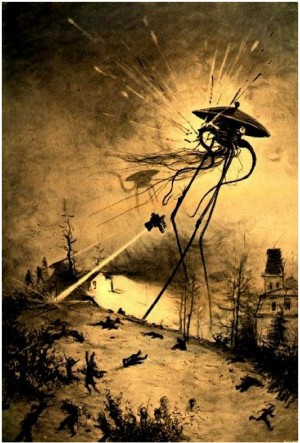 When H.G. Wells wrote The War of the Worlds in 1897, there was no such thing as science fiction. Wells wrote social commentary and satire, often with a scientific bent (hence their classification at the time as “scientific romances”). His story that we all know so well (no thanks to his near namesake Orson Welles) was not a scientific examination of invasion, but rather a comment on the United Kingdom’s penchant for empire. The novel provided a neat turn-around (in a safe, speculative way) that essentially asked Englander’s “So how do you like it?”
When H.G. Wells wrote The War of the Worlds in 1897, there was no such thing as science fiction. Wells wrote social commentary and satire, often with a scientific bent (hence their classification at the time as “scientific romances”). His story that we all know so well (no thanks to his near namesake Orson Welles) was not a scientific examination of invasion, but rather a comment on the United Kingdom’s penchant for empire. The novel provided a neat turn-around (in a safe, speculative way) that essentially asked Englander’s “So how do you like it?”
The ending (microbes infect and kill the Martians) is a final, telling cut: nothing short of a miracle was going to stop the British Empire Martians.
Wells’ point was well made, but the story itself had an interesting side effect by giving birth to the Earth-Invaded tale. And there certainly has been no shortage where that particular nightmare comes to play, with more than enough variety to keep us all interested.
.Some chronicle the resurgence of man after conquest (running the gamut from 1929’s Tumithak of the Corridors by Charles R. Tanner all the way up to and including the L. Ron Hubbard-inspired (if not written) Mission Earth decology; some report on the happenings as they occur – Damon Knight’s To Serve Man, Arthur C. Clarke’s Childhood’s End, Frederic Brown’s Martians, Go Home!, the televised and re-booted V, 1960’s The Invaders, Gerrold’s Chtorr series (the list is nearly endless). A few chronicle our revenge (Edison’s Conquest Of Mars by Garrett P. Serviss – a direct response to Well’s novel) being the exemplar; still others posit our near annihilation (CC MacApp’s Recall Not Earth; the animated film AE)

I’m here to say that every single one of them, as gripping and entertaining as they may be, have gotten that invasion thing wrong. So wrong that our conquerors are probably laughing at us right now.
The one mistake that they all share in common is this: we’re aware of the invasion and might be able to do something about it.
Wells’ story pretty much set the trope for at least 75% of all Invasion Earth fare. The plot generally runs like this: The invaders are technologically superior; They invade; World society collapses; A handful of plucky survivors somehow manage to survive and frequently discover/invent/fall onto the solution to humanity’s ills; The aliens are defeated, humanity is triumphant.
The master, H.G. Wells, didn’t go the easy route; humanity was on the brink of extinction before an outside force did the Martians in. Of course most SF tales that follow his formula aren’t sociological treatises either, so I’m pretty sure we’ll all forgive Mr. Wells his departure from form.
But even he made the mistake of assuming that we (humanity) were A: aware that an invasion was taking place and B: were able to attempt solutions to the problem.
 Lets turn our attention for the moment to the realities of warfare. As was originally written by Sun Tzu (“The line between disorder and order lies in logistics…”) and commented on by nearly every successful military leader since, logistics – transporting men, equipment and supplies to the battlefield in a timely, efficient and sustained manner – is vital to the proper execution of military action. Alexander – “My logisticians … know if my campaign fails, they are the first ones I will slay” ; Patton (who spent time between WWI and WWII studying the road network of Eastern France) “the officer who doesn’t know his communications and supply as well as tactics is totally useless” All of it perhaps best summed up by General Nathan Bedford Forrest (CSA) who is supposed to have said “He who gets there firstest with the mostest, wins”.
Lets turn our attention for the moment to the realities of warfare. As was originally written by Sun Tzu (“The line between disorder and order lies in logistics…”) and commented on by nearly every successful military leader since, logistics – transporting men, equipment and supplies to the battlefield in a timely, efficient and sustained manner – is vital to the proper execution of military action. Alexander – “My logisticians … know if my campaign fails, they are the first ones I will slay” ; Patton (who spent time between WWI and WWII studying the road network of Eastern France) “the officer who doesn’t know his communications and supply as well as tactics is totally useless” All of it perhaps best summed up by General Nathan Bedford Forrest (CSA) who is supposed to have said “He who gets there firstest with the mostest, wins”.
 We’re pretty sure that the planets of our solar system do not harbor technological life, which means that it is a foregone conclusion that any aliens invading Earth are going to have to cross interstellar distances before they commence with the pillaging and burning. What this means in pure military terms is that our erstwhile alien foes will be at the end of a very long supply train, while we, ignorant savages all, will be sitting right atop ours. The British empire itself encountered this kind of problem – facing a technologically inferior foe at the end of a long supply train – during the Zulu Wars. It turns out that spears and knives and cudgels are pretty effective weapons…once the bullets run out.*
We’re pretty sure that the planets of our solar system do not harbor technological life, which means that it is a foregone conclusion that any aliens invading Earth are going to have to cross interstellar distances before they commence with the pillaging and burning. What this means in pure military terms is that our erstwhile alien foes will be at the end of a very long supply train, while we, ignorant savages all, will be sitting right atop ours. The British empire itself encountered this kind of problem – facing a technologically inferior foe at the end of a long supply train – during the Zulu Wars. It turns out that spears and knives and cudgels are pretty effective weapons…once the bullets run out.*
 Another consideration of modern warfare is the sheer economic scope of the enterprise. The United States recently went deeply into the hole during and following its adventures in Afghanistan and Iraq. Of course an interstellar empire capable of invading distant solar systems will presumably have a larger economic base to draw from (not to mention a far more efficient economy), but no matter how you slice it, that alien empire is going to have to spend a lot of time, skilled labor and physical resources before it has any hope of gaining a return on its investment.
Another consideration of modern warfare is the sheer economic scope of the enterprise. The United States recently went deeply into the hole during and following its adventures in Afghanistan and Iraq. Of course an interstellar empire capable of invading distant solar systems will presumably have a larger economic base to draw from (not to mention a far more efficient economy), but no matter how you slice it, that alien empire is going to have to spend a lot of time, skilled labor and physical resources before it has any hope of gaining a return on its investment. And it hardly matters whether they’re coming here to steal our water, enslave our population, steal our women, force us to join their collective or engage in the galaxies’ biggest mass probing ever. Interstellar invasion may in fact prove to be economically non-viable (which is usually why we end up seeing motives other than lebensraum; not to mention that we’re pretty sure such a technically advanced civilization could find whatever they might take from us far more cheaply from their own version of the Oort Cloud).
And it hardly matters whether they’re coming here to steal our water, enslave our population, steal our women, force us to join their collective or engage in the galaxies’ biggest mass probing ever. Interstellar invasion may in fact prove to be economically non-viable (which is usually why we end up seeing motives other than lebensraum; not to mention that we’re pretty sure such a technically advanced civilization could find whatever they might take from us far more cheaply from their own version of the Oort Cloud).
 Finally, there is the home front. The US has had its own problems in that regard (Viet Nam). It is of course largely futile to speculate on what form alien hippies would take, but chances are pretty good that our aliens are not an entirely monolithic society. There’s probably some dissent and it doesn’t matter whether it’s on political, moral or economic grounds. Some of those aliens are going to be trying to throw a monkey wrench into the works and (remember, interstellar distances) the longer the invasion takes, the more chances that wrench will have to muck up something vital.
Finally, there is the home front. The US has had its own problems in that regard (Viet Nam). It is of course largely futile to speculate on what form alien hippies would take, but chances are pretty good that our aliens are not an entirely monolithic society. There’s probably some dissent and it doesn’t matter whether it’s on political, moral or economic grounds. Some of those aliens are going to be trying to throw a monkey wrench into the works and (remember, interstellar distances) the longer the invasion takes, the more chances that wrench will have to muck up something vital.
For these and a host of other reasons, it is very unlikely that an alien invasion will take place in the ways we are all familiar with.
What’s far more likely is a stealth invasion. One so stealthy that we won’t be able to recognize it for what it is.
 We’ve known for quite some time now that cosmic dust fills the cosmos and some of it incidentally drifts down through our own atmosphere. Numerous space missions have included dust collectors (Helios, Pioneers, Galileo among them) that have returned intriguing samples.
We’ve known for quite some time now that cosmic dust fills the cosmos and some of it incidentally drifts down through our own atmosphere. Numerous space missions have included dust collectors (Helios, Pioneers, Galileo among them) that have returned intriguing samples.
Then there’s the formerly discredited Panspermia theory, first articulated as more than speculation by Sir Frederic Hoyle and more recently commented on by Dr. Stephen Hawking: “Life could spread from planet to planet or from stellar system to stellar system, carried on meteors.”
 And finally – Viruses From Spaaaaaace! The online journal Cosmology has a number of papers devoted to this subject, which essentially boil down to this: we have discovered more than enough bacterial and viral extremophile examples right here on Earth to support the notion that viruses (if not bacteria) could evolve to survive millennial long journeys through the cosmos, intact, and capable of reproducing when they were once again introduced to a favorable environment. Like the biosphere of a certain Class M planet orbiting an unremarkable G-type sun.
And finally – Viruses From Spaaaaaace! The online journal Cosmology has a number of papers devoted to this subject, which essentially boil down to this: we have discovered more than enough bacterial and viral extremophile examples right here on Earth to support the notion that viruses (if not bacteria) could evolve to survive millennial long journeys through the cosmos, intact, and capable of reproducing when they were once again introduced to a favorable environment. Like the biosphere of a certain Class M planet orbiting an unremarkable G-type sun.
Finally back to warfare. Surprise – attacking at a time or place that is unexpected – is considered by all military experts to be a force-multiplier, enhancing the effects of whatever you bring to bear against an enemy.
Experts also recommend fighting by not fighting; , a tactic strongly endorsed by Sun Tzu and echoed in this Napoleonic wisdom: “I have destroyed the enemy merely by marches.”
Approaching the problem of interstellar invasion in a logical manner (one presumes that our alien foes possess logic, otherwise their technological superiority comes into question), it is quite reasonable to assume that they too will appreciate the benefits of conducting a war without fighting, a war without the necessity of supply trains light years long, of not having to fight a two-front war (us and at home), one that doesn’t require an investment in people, resources and treasure.
Invasion Earth is actually a quite simple and relatively inexpensive proposition; remote probes (undetectable of course) or advanced forms of astronomy will gather biological data remotely. That information will be used to tailor virii and perhaps bacteria, a host of different forms that will be given the wherewithal to survive vacuum, cosmic rays, terrible heat, terrible cold and these weapons will then be cast into the void, where they will drift inexorably towards their target.
The alien bio-weapons will drift down through our atmosphere, completely undetected, where they will slowly begin to negatively affect our biosphere.
We’ll have no clue; species will die off from unknown causes (Amphibians? Bees? Corals?); we may even mistakenly believe that its our own fault and engage in ultimately futile efforts at correction.
 At some point a key species (perhaps even ourselves) will fall prey to one or another tailored virus and the biome will collapse, extinction accelerating across the globe.
At some point a key species (perhaps even ourselves) will fall prey to one or another tailored virus and the biome will collapse, extinction accelerating across the globe.
Humanity will go, not with a bang and without even time for a whimper, never even realizing that the past several decades of unceasing ecological disaster was engineered, rather than a consequence of our own follies.
Kinda makes you wonder, don’t it?
*Zulu victories in this war were due more to superior tactics than any other factor.











Good post! Unfortunately you have inadvertently discovered my cunning invasion plan, pesky human, and you will must be exterminated, immediately!
As soon as my supply of Zap Guns arrive from Arcturus, you will be very sorry indeed!